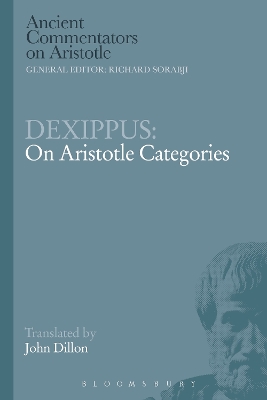Ancient Commentators on Aristotle
2 total works
Dexippus, a pupil or follower of lamblichus, preserves a crucial moment in the Neoplatonist interpretation of Aristotle. Aristotle's Categories has been attacked by Plotinus, but Porphyry's defence proved decisive, so that the Categories was acceptable as compatible with Platonism and an essential introduction to the Neoplatonist curriculum.
Porphyry's main commentary on the Categories, however, containing the vital defence, is lost, as is that of his pupil lamblichus. The ideas of these two principal Neoplatonists can be reconstructed, in part, from Dexippus.
Porphyry's main commentary on the Categories, however, containing the vital defence, is lost, as is that of his pupil lamblichus. The ideas of these two principal Neoplatonists can be reconstructed, in part, from Dexippus.
Aeneas of Gaza: Theophrastus with Zacharias of Mytilene: Ammonius
by Sebastian Ramon Philipp Gertz, John Dillon, and Donald Russell
Published 10 January 2013
50 years before Philoponus, two Christians from Gaza, seeking to influence Alexandrian Christians, defended the Christian belief in resurrection and the finite duration of the world, and attacked rival Neoplatonist views. Aeneas addresses an unusual version of the food chain argument against resurrection, that our bodies will get eaten by other creatures. Zacharias attacks the Platonist examples of synchronous creation, which were the production of light, of shadow, and of a footprint in the sand. A fragment survives of a third Gazan contribution by Procopius. Zacharias lampoons the Neoplatonist professor in Alexandria, Ammonius, and claims a leading role in the riot which led to the cleverest Neoplatonist, Damascius, fleeing to Athens. It was only Philoponus, however, who was able to embarrass the Neoplatonists by arguing against them on their own terms.
This volume contains an English translation of the works by Aeneas of Gaza and Zacharias of Mytilene, accompanied by a detailed introduction, explanatory notes and a bibliography.
This volume contains an English translation of the works by Aeneas of Gaza and Zacharias of Mytilene, accompanied by a detailed introduction, explanatory notes and a bibliography.

